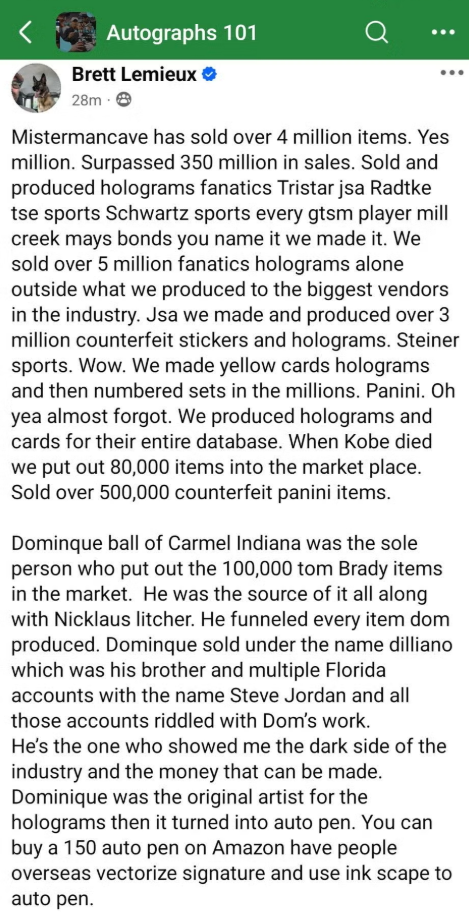
In a world where nostalgia meets investment, where fans clutch pieces of paper as sacred relics of their heroes, there emerges a story so dramatic it belongs in the hall of inexplicable enigmas. The heartland of America, Indiana, has become the unlikely backdrop for a scandal that has rippled through the sports memorabilia industry like a seismic event. A connoisseur turned counterfeiter, Brett Lemieux, once a lauded forge master of sporting signatures, has sent his community into a tailspin following his unexpected demise during a dramatic raid.
The narrative could have belonged to a Hollywood film script, yet, it blends reality with unparalleled audacity. Authorities in Indiana have now shed light on a counterfeit operation thought to have shifted the very foundations of the memorabilia market, filling it with whispers of fraud and deceit. Brett Lemieux, an autograph dealer who lived by the pen’s stroke, finds himself posthumously accused and tragically removed from the scene he so profoundly influenced—in a manner that bordered on the poignant and the tragic.
While the Hamilton County Coroner’s Office stays silent on the official cause of Lemieux’s death, Westfield police reports paint a vivid picture of a life ended with a self-inflicted gunshot wound. The event was set against the backdrop of a police raid that targeted a sprawling network of counterfeit sports memorabilia, allegedly steered by Lemieux himself. Orchestrating this fiasco under the business banner of Mister Mancave, Brett’s alleged empire reportedly spanned territory both as physical as the heart of Indiana and as illusory as the innumerable hologram stickers that stood as pillars of authenticity—each a felonious forgery in themselves.
In a plot that reads like a confessionary preamble, a post linked to Lemieux surfaced in the “Autographs 101” Facebook group. He unveiled what many collectors dared not whisper: a possible $350 million symphony of deception, with over four million forged items let loose upon an unsuspecting market. To those who cherish signed memorabilia like fine art, the revelation felt like a Van Gogh counterfeit. The sheer volume and breadth hinted at a counterfeiting revolt, leaving buyers questioning not just the certificates but the very emotional bonds tied to these prized possessions.
Lemieux’s operation, Mister Mancave, wasn’t simply a virtual bazaar; it was a monument to trust blindly given to artful deceit. Claimed to boast the “largest framed jersey inventory on the web,” its authenticity was like clouds, ephemeral and ever-shifting. Despite licensing addresses in Columbus, Ohio, neither brick nor mortar testified to its presence.
From basketball’s hallowed legends like the late Kobe Bryant, to baseball icons like Aaron Judge, Lemieux’s alleged brush of deceit knew few bounds. He professed to a deluge of eighty thousand phony Bryant items alone, amidst collectible currents, complete with holograms as fraudulent as dreams dissolved. His prices undercut legitimate dealers, like wolves disguised in sheep’s memorabilia.
Fallout from these revelations has left the market in an uproarious state of introspection. Chief industry stalwarts like Fanatics have been thrust into a defensive stance, asserting improvements in hologram technologies and collaborations with fraud experts of former FBI caliber—a testament to their commitment to mend trust torn asunder by duplicity’s blade.
Irrespective of whether Lemieux’s reported sales figures stand under scrutiny, the cast of deceit has darkened. Autograph guru Steve Grad perceives a more ominous future, as counterfeit technology advances with the quiet menace of a shadow. The voices of competitors raise eyebrows at those stratospheric figures and the specter of doubt lingers, weaving narratives from fact and suspicion.
Unfazed by surprise, some in the industry had long harbored doubts, observing autographs claimed as fresh from athletes unseen at signing tables in years. As murmurs swell and echo, names tarred in Lemieux’s so-called “manifesto,” such as Dominique Ball and Nickolas Litscher, have stepped forward to distance themselves with fervent denials—Litscher even gears for a lawsuit, seeking to protect his reputation against the tide of scandal.
Justice marches on, unraveling a web that spanned pseudonyms like Ultimate Sports, Athletes One, Signature Dog, and All-American Authentics. Yet in this unraveling, collectors stand before an unnerving void where faith in authenticity was presumed.
As the dust settles, a lesson looms large: the scandal is not just an alarm but a harbinger. The sports collectible market—where passion meets commerce—must now embrace vigilant evolution over complacency. Amid the chaos, perhaps one enduring truth stands resilient: authenticity, like sport, is irreplaceable—the heart of all games not easily forged.
